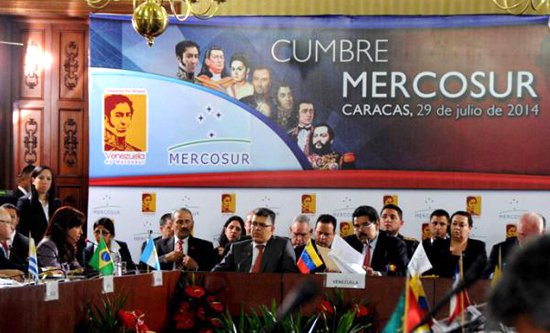
The Community of Latin American and Caribbean States (CELAC), composed of every country in the Americas except the US and Canada, met on 24 June for a three-day conference in Caracas, Venezuela. Drawing up a common plan to tackle social and developmental problems in the region, CELAC aims to eliminate poverty and malnutrition in Latin America and the Caribbean by 2024.
Tasks include universal access to education, health care and adequate nutrition. The statement was signed by key organisations participating in the conference, including UNESCO and other key United Nations bodies, the Union of South American Nations (UNASUR) and other regional organisations such as MERCOSUR, ALBA and Petrocaribe (an alliance of 18 regional states with Venezuela that allows them to purchase subsidised oil on conditions of preferential payment).
The achievement of these goals will depend on the strategic use of Latin America’s huge natural resources for its own development. As Ali Rodriguez Araque, from the UNASUR put it: ‘We have great contrasts in the region. On one hand we have high poverty levels, and on the other, we have the potential of huge wealth…only a strategy is missing,’
Recent elections in Panama and El Salvador have bolstered progress towards Latin American integration. El Salvador’s new president Salvador Sanchez Ceren, of the left-wing Farabundo Martí National Liberation Front took office on 1 June and announced that El Salvador would join Petrocaribe. This will allow El Salvador to purchase oil and pay 50% of the cost within a month of delivery, whilst paying the remainder over 25 years or by providing Venezuela with goods and services such as food or other agricultural products. It is hoped that this will allow El Salvador to double its investments in education and public security.
Other member states include Belize, Cuba, Dominica, Granada, Antigua and Barbuda, the Bahamas, Guyana, Haiti, Saint Kitts and Nevis, Honduras, Jamaica, Nicaragua, the Dominican Republic, Saint Vicente and the Grenadines, Saint Lucia, and Surinam.
Meanwhile, the election of Juan Carlos Varela as president of Panama in May presents a new opportunity in the battle against socialist Cuba’s exclusion from the US-dominated Organisation of American States (OAS) in which the US and Canada have vetoed Cuba’s presence since 1962. Despite a successful vote to revoke Cuba’s exclusion at an OAS plenary in Honduras in 2009, Cuba was not invited to the following summit in Cartagena, Colombia in 2012. Valera replaces US stalwart Ricardo Martinelli, the outgoing president who controversially demanded the OAS intervene in Venezuela in March this year and gave Venezuela’s right-wing opposition leader, Maria Corina Machado, Panama’s seat at an OAS meeting in Washington. Varela has re-established diplomatic relations with Venezuela, signalling a change in alliances for the Central American country.
At the June OAS general assembly meeting, Bolivia, Ecuador, Nicaragua and Venezuela all stated they will boycott next year’s OAS Summit of the Americas in Panama if Cuba is excluded; Brazil and Argentina have also identified their reluctance to attend. At least 20 countries spoke out against Cuba’s exclusion, leaving the US Deputy Secretary of State for Management and Resources Heather Higginbottom and permanent OAS representative, Carmen Lomellin as lone voices of objection, with passive support from Canada. As the final decision is made by the host country, Varela and his nationalist Panamenista Party could deal a decisive blow to US imperialism in the region.
Scott Adams




